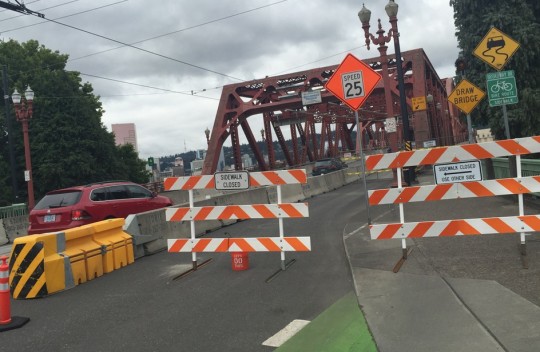
(Photo © J. Maus/BikePortland)
Multnomah County is in the midst of a major project to repaint the Broadway Bridge. When that work results in the closure or narrowing of the bridge’s biking and walking paths, some bicycle riders feel the County should do more predictable detours and safer conditions in the work zones.
Here’s what reader Dan C. emailed us on August 17th:
Upon crossing the Broadway Bridge at about 9:30 this morning came across a pack of people that were all confused as to what to do. Cars were allowed through 1 lane in each direction, but the west-bound sidewalk was completely shut down and no directions at all as to what to do.
…
I ended up going slowly between the two rails and had a small gang behind me. This is pretty harrowing though because 1′ in either direction means an instant crash and a mangled bike (along with a mangled me)… Additionally it’s unsafe to go on the Eastbound side of the sidewalk as a good section of that sidewalk is already too narrow to safely get a single bike, much less 2 bikes in opposite directions.
There also weren’t any signs on Interstate Southbound or Broadway Westbound indicating that there would be issues.
Once again, cycling as transit is a lingering afterthought during any construction project.
And two days later we got a similar email from reader Matt O:
I’m not one to complain, but the Broadway Bridge bike lane closure has made me, as a bike commuter, feel like a second class form of commuting. I say this because there is nothing, that I can find, informing bicycles that the 1) one sidewalk would be closed and 2) that the other one would be single file. It would be nice to know if biking on the Broadway Bridge car lanes should be considered, because the sidewalk is becoming a serious safety issue. I know there is work to do on the bridge, but I’d like there to be more readily available information for us bicyclists (not just on this site). And if someone in the city saw the cluster*%*$ on the one, two-way, single file sidewalk they’d immediately attempt to remedy the situation (or at least that is my hope).
For me, I’m going to start biking on the roadway because the sidewalk is becoming a hazard for those people walking and they deserve feeling safe on their commute more so than a bicyclist.
Advertisement
I forwarded both of these emails to Mike Pullen in Multnomah County’s communications office. He said they were “surprised” that some people found their signs confusing.
Here’s more from Pullen’s response:
“We realize that closing one of the Broadway Bridge sidewalks is inconvenient for the many bicyclists and pedestrians that use the bridge. However, we are a little surprised that some sidewalk users are confused by our detour signs directing them where to safely cross to the open sidewalk.
Our staff working in the field report that some bicyclists are riding past barricades and “Sidewalk Closed” signs and then crossing lanes of bridge traffic when they get to the closed section of the sidewalk.
We’ve sent out news releases, tweets (@MultCoBridges) and updated our website to get the word out about the sidewalk closures.”
Pullen also told me that the County is working with the project contractor on a plan that will close just one sidewalk for several weeks; but will keep the other sidewalk completely open without any scaffolding or barriers. I’ll share more about that new plan in the next week or so.
In the meantime, keep us posted on your experiences with this project via email or Twitter (@BikePortland). You can also email your concerns directly to Mr. Pullen at mike.j.pullen@multco.us.



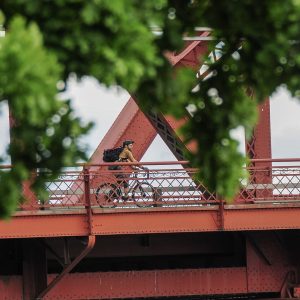
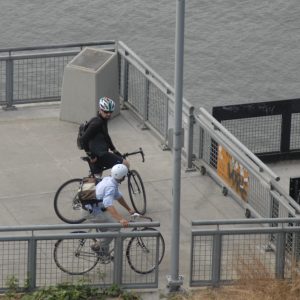
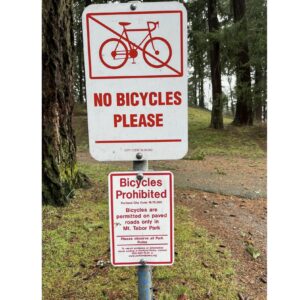
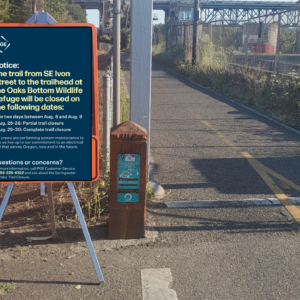
Thanks for reading.
BikePortland has served this community with independent community journalism since 2005. We rely on subscriptions from readers like you to survive. Your financial support is vital in keeping this valuable resource alive and well.
Please subscribe today to strengthen and expand our work.
It seems every rider that uses the Broadway Bridge since the construction began has had an Angry Unbalanced Homeless Person blocking the path near the scaffolding.
Getting around generic people and tourists usually isn’t much of a problem if you are patient, but it can be annoying when they aren’t aware of their surroundings.
The homeless person you describe (and others like him) is the EXACT reason I bought an ORP.
When they closed the bridge to cars, there were signs for miles. When they closed the bridge to bikes, they put a sign up that you can’t read unless you’re already at the closure.
A huge difference in how road users are treated. Not to mention that the signs stating that the bridge was closed for drivers were put IN THE SIDEWALK, which blocked people in wheelchairs from getting to and from places that weren’t even near the bridge.
It conveys a very poor message if in response to “your signs aren’t clear”, the first reaction is “why don’t you understand my signs?” rather than “what can we do to make them clearer?”
But if the signs are clear, which these are, then the next question has to be “why don’t you understand my signs?”
If the signs can’t be read unless you’re in the intersection, they don’t do a good job of warning people BEFORE the intersection. Not to mention that there was no signage in advance of the closure, unlike there were for people in their precious autos.
actually the reader comments where:
“Why aren’t there any signs?”
to which they replied:
“Why don’t they understand our signs?” instead of the proper response of “Why don’t they see our signs?”
There’s one sign on the base of the lovejoy ramp that says Bike lane closed and then I think it says to use the lovejoy sidewalk ramp. But I can’t figure out why the bikelane is closed going up the ramp….the street is open. That’s confusing.
also, there’s no bike lane on the Broadway bridge…
Bicycle and pedestrian loads are so light I’d think that the US military (Army Corps of Engineers?) would have some sort of low load weight temporary bridge structure type “thing” that could be deployed (again) temporarily when these conditions exist.
I have no desire to $pam the comments thread with my research into this subject.
Detours for pedestrian and cycling routes should be explained at several points in the network prior to the actual detour. People on foot or on bikes should be notified at places where they can effectively make adjustments to their routes without back-tracking.
This requires more work on the part of PBOT and contractors, to be sure, but it’s the right thing to do.
One of the first things that I learned in design school is that if more than a few people are messing up or misusing your product, it isn’t their fault. It’s your job to design a product that makes it obvious how to use it.
The same can be said for signage and wayfinding. If a bunch of people are “missing” your obvious signage, then perhaps it’s not so obvious.
You probably also learned the importance of actually using the product you’re designing. Seriously, every road agency needs a bike.
This guy works in communications for the county and he thinks a press release is going to solve the problem? What year is this? While they can be helpful, they do not have much impact for this sort of thing. I don’t know anyone under 65 who watches local news, reads a paper regularly or even reads blogs like this one. Tweets? How many followers does Multnomah county have? Meanwhile there are signs for days on the freeway and all feeder routes to guide drivers.
Given that cars can cause major traffic jams during a closure like this, i can see why they focus on them. I don’t think the lack of signage or help for bicyclists is nefarious. Just general negligence and lack of competence.
It’s not the end of the world this happened here but it would be nice if people in charge realized that when dealing with bikes, it’s the little things which make a huge difference 🙂
it’s the ultimate Portland response- “I’m going to send a passive-aggressive letter. That’ll solve it!”
Mike P. is a standup guy and he’ll make it right.
I think the expectation that you can operate 2-way bike and ped traffic through the narrowed, scaffolded area is totally unrealistic (having ridden it). I’m not impressed by the County’s planning on this one.
4 lanes of traffic on the sidewalk, and 1 in the car lane. Hmm.
Didn’t BP just have an interview a few weeks ago with the outgoing director of LAB who has moved to PDX? I seem to recall that one of the things he really enjoyed about riding to work in DC was the total predictability of the time it would take him to complete his commute. In a car, the variable traffic jams caused by road work and collisions meant that he couldn’t plan his departure times as well.
It looks like he won’t have that sort of experience here. We go out of our way to make any trip by bike or foot an adventure while making sure motorists can count on as few disruptions as possible.
@Jonathan Maus
fwiw your email citations are mixed up. I know because I couldn’t say, “I’m not one to complain…” with a straight face. 😉
Thanks for looking into this. I’m not surprised at the response you got, and would love to know what steps we could do to get some actual action to occur to make sure cyclists-as-transit aren’t an afterthought that’s then brushed off and ridiculed.
In the meantime I’m detouring to the upper deck of the Steel Bridge for any westbound trips across the river.
Taking the Auto lane could be a good way to go… but the tracks are a bit gnarly and the traffic is now super slow and backed up – might be slower. The good news is the narrow part adds some extra excitement!
It’s sounds simple. Get off your bike and WALK the road. Do that a few times and maybe the county might wise up. It’s pretty nuts to think that a bicyclist or ped is going to cross right there at the bridge and head to the other sidewalk.
Because, you know, that’s totally safe.
I will take the lane if i see it close again.
it’s sad when we feel the need to ask if we can come off the sidewalk and ride our bike on the road…
Um, use the Steel? They’ve been working on the Broadway for weeks.
When the Broadway was closed down I assumed it was shut for everyone. It took me a bit longer than normal to get to the Amtrak station but it wasn’t that bad. 😡
Take the lane. Have a bunch of other people on bikes with you? Even better. If the surface is too risky to ride on? Walk your bike.
Bike detours as an afterthought or non-existent is a common theme alone local transport agencies here. There needs to be a standard for bike access during construction. Perhaps at the state level would be better since this is an issue with PBOT, ODOT, TriMet, MultCo, etc.
Together with my partner, we have probably ridden the bridge during construction more than anyone else: at least one, but as many as five round trips a day. Fortunately, that route is much less necessary to us now. We’ll probably take different bridges until the dust settles.
Is there any chance of consensus for a few issues not mentioned?
1) who yields to whom at these bottleneck? If it’s occupied, I wait, but sometimes it’s a game of chicken.
2) the left turn lane on N Broadway: use that? The “Copenhagen Left” *cringe* turn box can stack up at rush hour.
3) approaching NW Hoyt: ride all the way down the already-narrowed sidewalk (for construction signs!) or cross at the walk at the top of the viaduct? If at the walk, do you wait on the right (blocking Lovejoy access) or wait at the rail (crossing the path of uphill riders)?
4) speaking of compromised widths and crossing paths, at the east end of the south walk, inbound traffic seems to be using the sidewalk, experiencing the former and causing the other. In every technical sense it is wrong, but it feels like the right thing to do.
Ha. Had a cat six type (apparently identifying as female if you are keeping score) demand to pass me while I was yielding to a pedestrian in the scaffolding choke point. Advantage: cargo bike. The back of my hand to all such people.
Time to take the lane on the bridge…
I spoke with the Multnomah county bridge division’s engineer and on site manager during our BPCAC tour of the bridge the week before they reopened to auto traffic.
The consensus was that because the closures to the Pedestrian and bike path would be sporadic and short timed they would place signs as far up Broadway (from the bridge) as the N Williams crossing to alert cyclists and pedestrians that one side of the bridge would be closed.
Also we asked that they reach out to to the public via social media and I asked that they specifically reach out to Bikeportland.org to alert of each closure.
Obviously some if this did not happen as planned.
But I also understand why, believe it or not they are very concerned about cyclists and pedestrian safety during this repainting process. And they have a lot (I mean a lot!) of safety procedures in place and many aspects of managing all the procedures.
They are stripping lead paint from the bridge so they can finish the repainting, they’ve dealt with bad project management of contracts from the previous repainting. So they are having to not only manage the safety of the bridge crew but also account for the poorly executed street car integration on the bridge.
Their biggest fear is that pedestrians or cyclists get into the work zone during the stripping process and the possibility that they might be hurt or exposed to that process.
Also there was huge concern for pedestrian safety around the scaffolding zones, they wanted to have cyclists dismount and walk their bikes through that zone. But we discussed it and they realized it was unenforceable, and the consensus was to place signage for cyclists to yield to pedestrians at all times.
Again obviously this has not happened yet. But really that should be common sense and courtesy anyways right?!
The biggest message I took away from our meeting with County Bridges was that people need to be patient and allow them to prioritize safety for their crews, the environment, the public around the bridge and then road users.
I think it is a bummer as well that it is an inconvenience to have to go over to the Steel bridge and then work my way back over to the Pearl, but that crew is working with a shoestring budget and are trying to make due, so signage is a cost that may have had to been cut to a minimum as well.
The best thing to do is pay attention to the signage as a whole and realize that your best route is to avoid Broadway bridge for a while or at least during work hours.
And there is nothing wrong with letting them know that they could do a better job with sign placement, but leave it at that. It is not due to “carcentric” attitude but a long list of safety priorities and road users are at the very bottom.
Sounds pretty clear that pedestrians are at the very bottom, with cars above that.
The reality is that cars have highest priority of use on our current roads and bridges. Fighting that is a losing battle.
Until we increase our numbers of pedestrians, cyclists and public transit users we barely have a leg to stand on.
Right now we are the same as “that guy on the corner” with “The End is Near” sign standing on his soap box screaming incoherent babble and the only people listening are on the other corners screaming the same thing.
“You disapprove? Well, too bad! We’re in this war for the species, boys and girls. It’s simple numbers. They have more.”
Carl Jenkins – Starship troopers
Just take the lane.
But make sure not to run into scaffolding.
And don’t be drunk.
The narrow and crowded bike/ped path is an inconvenience, but just a temporary one. If you want to go fast, take the lane. Otherwise, ride slowly and/or walk your bike over the path among the pedestrians. Slows you down?. Yes, and we criticize drivers for endangering others by not slowing down.
My understanding is that the bridge work is going to continue for many, many months? A temporary detour to the Steel bridge is one thing, but I’m not so keen on such a route for the better part of a year. For my part, the signage approaching the bridge from the East side isn’t so bad, but navigating to the south lane heading west is a mess, and then trying to get back down to lovejoy is really unclear. I’ve been using the crosswalk and heading down to lovejoy on the sidewalk. Slow and not super safe feeling.